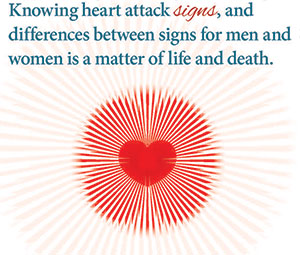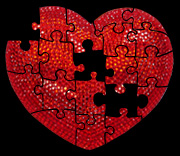Signs and symptoms of a heart attack . . . and what to do about them

The following are heart attack warning signs:
- Pressure, burning, tightness, or pressure-like discomfort in your chest, lasting five minutes or longer.
- Constant indigestion-like discomfort.
- Uncomfortable pressure in your chest that moves to your shoulders, arms, neck, jaw, or back.
- Lightheadedness, fainting, sweating, or a sick stomach.
- Unexplained shortness of breath.
- Unexplained anxiety, weakness, nausea or tiredness.
- Awareness of abnormalities in the normal beating of the heart, with unexplained sweating and pale skin.
Women may experience different warning signs before a heart attack, so it's important for women to be aware of them and take them seriously: (See Straight Talk About Heart Attacks in the Center for Women's Heart & Vascular Health.)
- Pain or discomfort in the center of the chest.
- Pain or discomfort in other areas of the upper body, including the arms, back, neck, jaw, or stomach.
- Other symptoms, such as a shortness of breath, breaking out in a cold sweat, nausea, or lightheadedness.
Dr. James Wilson, cardiologist, Texas Heart Institute at CHI St. Luke's
Health, explains how you can survive a heart attack and help educate
others.
"About one third of Americans who have a heart attack don't make it to the hospital alive," Wilson explains. "And about half of those who die suddenly from cardiac complications had no previous symptoms."
Still, there are warning signs for heart attacks that everyone should be aware of. "Not every heart attack victim has symptoms like we're used to seeing on television or in the movies," cautions Dr. Wilson. "It's not always a sudden pain in the chest where the person clutches his shirt and collapses to the ground. The symptoms can be much more subtle than that. Angina, the main symptom of a heart attack, literally means 'anguish,' not pain."
|

If you suspect a heart attack,
get help quickly.
|
Many people delay getting critical medical care because they do not know that these symptoms may be associated with a heart attack; they think that a heart attack always "hurts."
But anyone who has any of these signs for five minutes or longer should see a doctor right away. Call an ambulance (dial 9-1-1) or have someone drive you to the nearest hospital emergency room. Do not drive yourself to the emergency room. If you are having a heart attack, driving could be dangerous to you and others.
"As with men, women's most common heart attack symptom is chest discomfort," says Dr. Wilson. "But women are somewhat more likely than men to experience some of the other common symptoms, particularly shortness of breath, nausea or vomiting, and back or jaw discomfort."
Regardless of your gender, getting proper medical care as quickly as possible is key to surviving a heart attack. Clot-busting drugs called thrombolytic agents have increased survival rates for heart attack patients when these medicines are given as soon as possible after an attack. These drugs and other artery-opening treatments can stop a heart attack in its tracks and can prevent or limit damage to the heart. To be most effective, they should be given within one hour of the start of heart attack symptoms.
"If you think you're having a heart attack, call 9-1-1 and get to an emergency room," says Dr. Wilson. "EMS [Emergency Medical Services] is very well trained in the recognition and treatment of heart attacks and will take you to a hospital that is capable of providing first rate care for such an event."
See also on this website:
Updated August 2016



